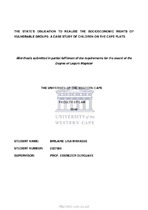| dc.description.abstract | The Cape Flats is known for poverty, gangsterism, over population and a general lack of basic necessities. What is often overlooked is where this negative perception emanates from. Generational poverty is an existent issue and has been influential in shaping the Cape Flats to what it is today.
What this study aims to do, is to provide a background on a possible theory for this typecast that accompanies the areas broadly known as the Cape Flats. The study will show how the Apartheid era created a ripple effect for future generations, and how this may be the cause of these vulnerable groups of children being failed by a system which have long forgotten about them. The study demonstrates how vulnerable groups on the Cape Flats, struggling and pleading for State intervention in the delivery of basic human rights, have fallen on deaf ears. The study further reveals that the State has not fulfilled its constitutional mandate, neither has it lived up to the enabling provisions contained in international instruments which has been adopted by the South African government, and confirms that all three spheres of government have lacked in the accomplishments it set out to achieve upon the adoption of various pieces of legislation, notwithstanding the proclamation of domestic laws to help the State realise its socioeconomic rights obligations. The study was a particularly challenging task to undertake, as research topics on the issue of socioeconomic rights realisation on the Cape Flats is not a well-studied subject. The intention behind the study is to make an important contribution towards awareness of the issue under discussion, paving the way for future knowledge sharing and an open dialogue focusing on the role of the State in the realisation of socioeconomic rights of children on the Cape Flats. | en_US |

